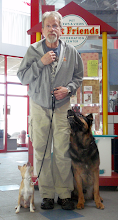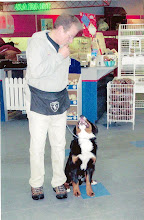When Accidents Happen: Re-Housetraining Your Pet
Even the best-trained pet can have a temporary housetraining lapse. Cold weather and changes in a pet's schedule, food or environment can also result in an occasional "accident."
But when accidents continue to pile or puddle up on your floor, intervention is in order.
Before you can correct the problem, you need to identify its source. Some possibilities include:
Medical reasons -- Because your pet wants to please you and won't intentionally disobey, a physical cause (such as an infection or illness) should be considered before anything else. See your veterinarian if housetraining errors persist.
Change in the environment - If something - or someone - new has been added to the household, your pet may feel threatened. Be sure to include your pet in the introductions and devote some extra attention and playtime.
Scents and odors from other pets can stimulate your pet to mark his territory as well. Be sure to clean any soiled areas thoroughly, using a solution that remove odors (these products are available at your local Best Friends center ).
Fears or phobias - Animals can lose bladder or bowel control when they're frightened by a loud noise or sudden sound. Your pet may also soil the house as a result of separation anxiety. Be sure to discuss these symptoms with your vet and/or professional trainer.
What NOT to do
Never punish your dog if she's had an accident in the house! Unless she's actually caught in the act, your pet will have no idea what she's done to upset you. Punishment after the fact will add to your pet's stress, or may make your pet afraid to eliminate in your presence.
Even if you catch her in the act, don't hit or hurt her. Instead make a loud noise to interrupt your pet, and then quickly take her outside to her toileting area.
Don't blame your pet if the accident is a result of your bad timing. Learn your dog's signals and stick with established routines. Don't expect your pet to be able to "hold it" longer than she's physically capable.
Getting back on track
Once the basic problem is identified, the best way to re-establish housetraining is with a consistent routine because dogs are creatures of habit.
Feed your dog at the same time every day, and take him out at the same times to the same elimination area. Praise your dog when he eliminates outside.
Until housetraining is re-established, it's important to supervise your pet as much as possible. Don't give him the opportunity to eliminate in the house, because an accident can set back the re-training. This may mean you need to temporarily crate or confine your pet during this period. If so, make sure he is comfortable and has something to play with or chew on. Be sure to take him out to eliminate as soon as you return home.
Newly adopted dogs
Many adult dogs adopted from rescue shelters have been previously housetrained. However, due to circumstances at the shelter, their housetraining may have lapsed. If this is the case with your pet, start the housetraining process from the beginning.
Be consistent, and above all, patient, and your pet should be back to his outdoor business in no time.








No comments:
Post a Comment